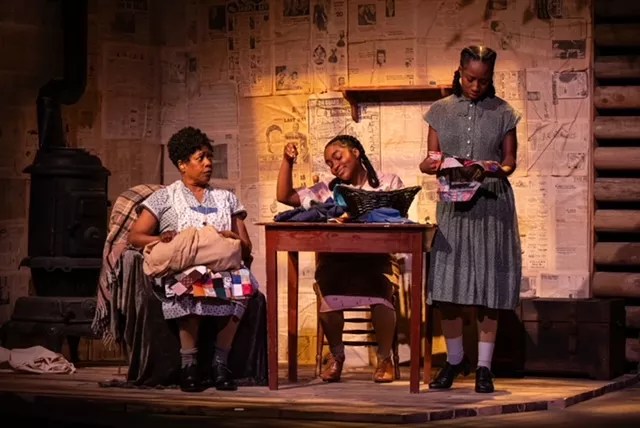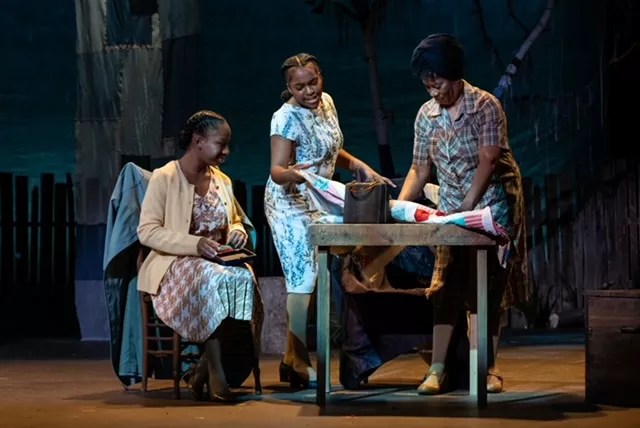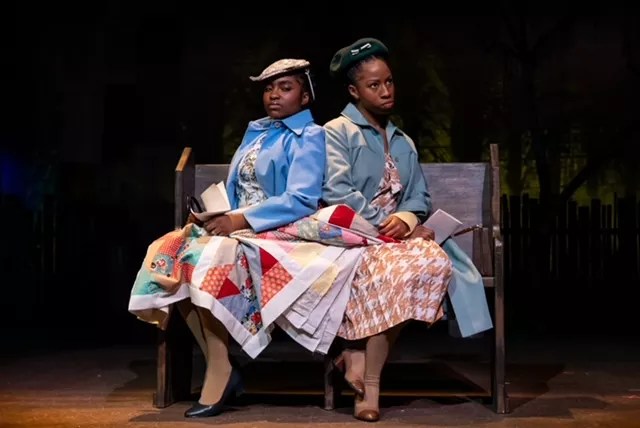
Courtesy of RDG Photography

Audio By Carbonatix
With book bans on the rise and educational policies seeking to restrict discussions of systemic racism, the act of preserving and telling Black stories has become more urgent than ever for local artists.
“I feel like there are a lot of Black stories that are disappearing, so anytime we get to tell something from history, it’s so important because no one else is going to tell them,” says actor Sheryl McCallum, who plays Alice and Asia in the Aurora Fox Arts Center‘s production of Gee’s Bend. “For me, the fact that a lot of people don’t know about the quilts of Gee’s Bend and the women who made them means it’s important to tell these stories so they don’t disappear.”
In this spirit, the Aurora Fox presents Gee’s Bend, a play that illuminates the tenacity and artistry of Black women in a small Alabama community.
“The main thing I was attracted to was the people’s story of resilience,” says director donnie l. betts. “They have to depend on a ferry for transportation, and that ferry is cut off because of segregation and racism. What do they do? As the saying goes, ‘They find a way when there’s no way,’ and they did it by using something that some people, even people in Gee’s Bend, considered trash: their quilts. Now they’re pieces of art that hang in museums, but quilting started as a way to keep themselves warm, and in doing that, they make these incredible patterns that tell their story.”
Gee’s Bend first came to Denver in 2008 through the Denver Center Theatre Company, then under the artistic leadership of Kent Thompson, who had previously commissioned the play while leading the Alabama Shakespeare Festival. Both betts and Richard Cowden, the Aurora Fox’s executive producer and artistic director, saw that production, which fueled their desire to bring it back to the stage today.
“Gee’s Bend is a tremendous example of telling the stories of generations, but in a highly compressed form,” Cowden says. “The play has a small cast, a single set, and yet we become transported through both space and time as we become immersed in a world where the histories of a people are told through the textile arts.”
Although the Aurora Fox had previously committed to staging August Wilson’s entire ten-play American Century Cycle, obtaining the rights proved to be a lengthy process. In the interim, Cowden saw Gee’s Bend as a meaningful addition to their season, continuing the tradition of telling vital Black American stories that they started last year with Gem of the Ocean.
“The tradition of oral storytelling for African Americans is so critical because a lot of things were taken from us as we were enslaved here in America,” betts notes. “This play carries on the spirit of historic storytelling that August Wilson is such a master of. All the characters are composites of the women and men in Gee’s Bend who were alive during the Southern Freedom Movement, which is a great storytelling device for the audience to latch onto and to carry on the tradition of
August’s Century Cycle.”
Spanning six decades, Gee’s Bend follows Sadie (Yasmine Emani Hunter) and her family as they navigate segregation, family conflict and the Southern Freedom Movement. Their quilting traditions, initially born out of necessity, have become a profound mode of self-expression and survival.

“Gee’s Bend is a tremendous example of telling the stories of generations, but in a highly compressed form,” says the Fox’s executive producer and artistic director, Richard Cowden.
Courtesy of RDG Photography
“[Sadie] starts off at fifteen years old,” Hunter explains. “We’re seeing her play the role of being ideal in her mother’s eyes but she’s starting to be tempted by the themes of life that we all want to experience – relationships and independence. Sadie’s strong-willed and maybe a little mischievous, but also a confident, loving, family-oriented young girl turned woman.”
Sadie’s mother, Alice, played by McCallum, represents a generation of women who endured systemic barriers with quiet strength, while her sister, Nella (Daja McLeod), is headstrong and determined to carve her own future. With a script that jumps across decades, actors must convincingly age before the audience’s eyes.
“One of the actors [McCallum] is kind of in the middle of the age range, but the other three actors are young,” betts says. “Their challenge is to do that aging onstage, and they’ve been up to the task.”
Quilting is central to Gee’s Bend because the real-life women who inspired the play made quilts out of fabric scraps to keep warm. The actors collaborated closely with Denver’s Rocky Mountain Wa Shonaji Quilt Guild on proper technique, meeting with members to hear their stories and touch the quilts that would be displayed on stage.
“I thought it was really beautiful to get to work with local quilters,” Hunter says. “One of the questions I asked was, ‘Where in your life were you when you got called to quilt?’ When we see people become very skilled at something, we often wonder about their mindset when they were still novices, so I wanted to know how they got into it.”
McCallum found the quilting sessions equally eye-opening. “The quilters were women of different ages and ethnicities,” she says. “I was expecting a bunch of little Black women to come in there, but the types of people ran the gamut and their different styles of quilting were really wonderful.”
The play also incorporates traditional African American storytelling methods, including acapella music. For betts, this choice reflects the reality of the time period and the historical significance of traditional work songs.
“The music of the era is so important to me,” betts says. “Everything the ladies do is all acapella, just as it would have been done there. They didn’t use instruments; they just sang as they worked, which reflects the real tradition of African Americans singing as we work.”
The struggles faced by the women of Gee’s Bend reflect broader narratives of cultural preservation. Their story is not just about survival but about the power of art and community to endure against the forces of oppression.

“The tradition of oral storytelling for African Americans is so critical because a lot of things were taken from us as we were enslaved here in America,” notes director donnie l. betts.
Courtesy of RDG Photography
“We are at a point in history where we are being called to examine the physical communities in which we actively participate,” Hunter says. “Even something as niche as quilting, which is a dying art in modern times, but the act of it existing, serves as such a marker of evolution. It’s really important right now to be telling stories that really highlight the importance of being a part of your immediate world and learning the history of our people, time and essence so that you can continue to pass along the things that make the world more exciting to engage with.”
As Gee’s Bend plays out on stage, it reminds audiences that storytelling, whether through words or stitches, is essential to preserving culture.
“This is not something just for me – it’s so Black history is not forgotten,” McCallum says. “Every time somebody tells a story, somebody is going to learn something, so for me, it’s important that these stories do not disappear.”
Gee’s Bend runs through Sunday, February 23, at the Aurora Fox Arts Center, 9900 East Colfax Avenue. Tickets are $17 to $42; learn more at aurorafoxartscenter.org.